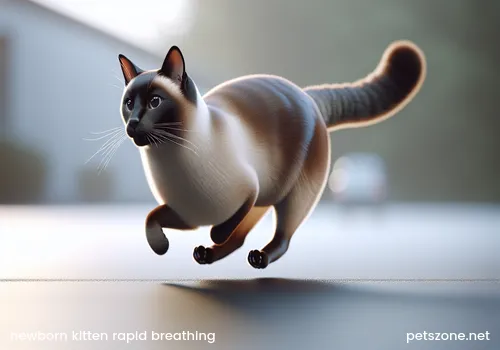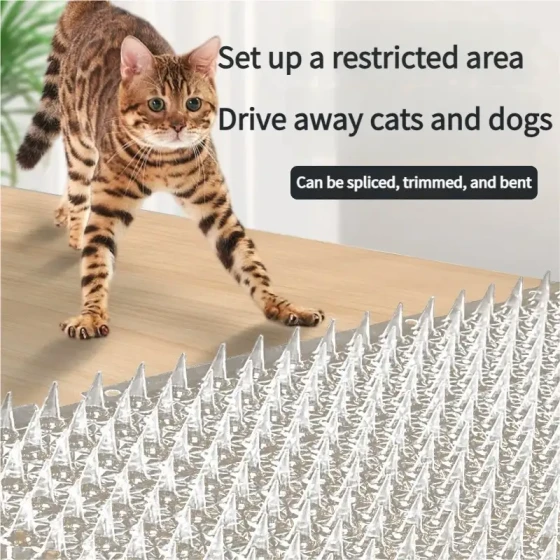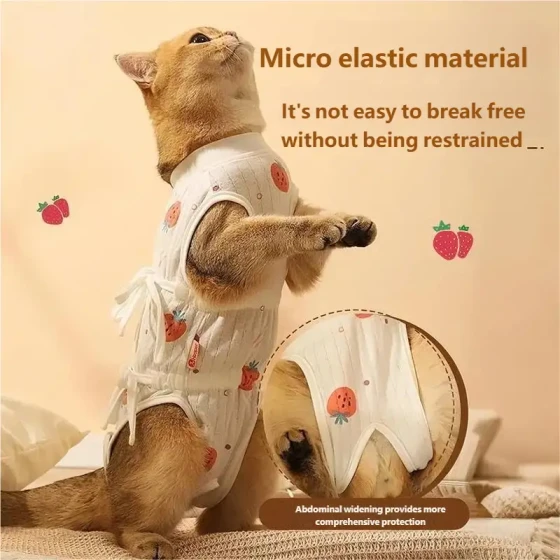Just Born Kitten Rapid Breathing_Reasons and Responses to Respiratory Abnormalities in Newborn Kittens
Newborn kittens are like fragile little lives, and their health status concerns every "poop scooper" deeply. When rapid breathing is noticed in just born kittens, it is often not simply because they ran too fast (they don’t run that fast anyway), but an important alarm from their body. Normal kitten breathing should be steady and regular, about 20-40 breaths per minute. If the kitten’s breathing rate far exceeds this range, or shows signs of labored breathing, open-mouth breathing, severe abdominal movements (as if using all its strength to breathe), and other abnormalities, immediate attention is required.

The "Culprits" Behind Rapid Breathing in Newborn Kittens
The causes of rapid breathing in newborn kittens are various, some common and some indicating serious health crises. Understanding these potential causes helps us better judge and respond.
1. Environmental Factors: The Invisible "Killers"
- Low Temperature (Hypothermia): Kittens have very weak body temperature regulation. If the environment is too cold (especially below 28-30°C), they will try to generate heat by shivering, which consumes a lot of energy and may lead to faster breathing to get more oxygen. Imagine shivering in cold winter – don't you also feel your breathing quicken? It’s a similar situation.
- Environmental Stress: Noisy, unstable environments or frequent moving can make kittens anxious and uneasy, triggering physiological responses including increased heart rate and breathing rate.
2. Respiratory System Problems: Direct "Blockage" of the Life Channel
- Respiratory Infection: One of the most common causes. Kittens’ immune systems are immature and easily infected by bacteria, viruses (such as feline herpesvirus, calicivirus) or fungi, causing upper respiratory infections (like a cat "cold") or more severe pneumonia.
- Symptoms: Besides rapid breathing, symptoms may include sneezing, nasal discharge, coughing, increased eye secretions, lethargy, decreased appetite, etc. Severe pneumonia can cause lung fluid accumulation or tissue damage, seriously impairing gas exchange and causing the kitten to struggle to breathe.
- Aspiration Pneumonia: More common in artificially fed kittens. Improper feeding posture or feeding too quickly can cause milk to enter the trachea instead of the esophagus, leading to aspiration pneumonia. This situation is very dangerous as foreign substances irritate the lungs, causing severe inflammation and breathing difficulty.
- Congenital Respiratory Tract Malformations: In rare cases, kittens may be born with structural defects in the airway, such as tracheal stenosis, nostril narrowing, which hinder airflow and cause breathing difficulties.
3. Cardiovascular System Problems: The Heart’s "Minor Faults"
- Congenital Heart Disease: Similar to human babies, some kittens are born with heart defects like ventricular septal defect, patent ductus arteriosus, etc. These heart problems cause abnormal blood circulation, lung congestion, leading to rapid breathing.
- Heart Failure: Whether caused by congenital heart defects or other reasons, heart failure can result in the heart’s inability to pump effectively, causing blood to pool in the lungs and making breathing difficult.
4. "Fading Kitten Syndrome": The Silent "Predator"
This term pains many breeders and rescuers. Fading Kitten Syndrome refers to newborn kittens gradually weakening and sometimes dying within the first few weeks for unknown reasons. Rapid breathing is a common symptom, usually accompanied by lowered body temperature, poor appetite, lack of weight gain, lethargy, muscle weakness, etc. The causes are complex and may involve infections (bacterial, viral), malnutrition, congenital defects, maternal abandonment, or insufficient milk. The condition progresses quickly and often catches people off guard.
5. Anemia: The Body’s Lack of "Oxygen"
Severe anemia reduces the blood’s oxygen-carrying capacity. The kitten’s body compensates by instinctively increasing breathing rate to inhale more oxygen. Anemia may be caused by parasites (like fleas, ticks causing excessive blood loss), malnutrition, or certain diseases.
Urgent Rescue: Measures to Deal with Rapid Breathing in Newborn Kittens
When rapid breathing in a kitten is noticed, every second counts. Here are some immediate response measures:
1. Emergency Treatment: Racing Against Time
- Keep Warm: Immediately move the kitten to a warm, quiet environment, avoiding direct wind. Use pet-specific electric heating pads (wrap with a towel to avoid burns), hot water bottles (wrapped in cloth), warm bottles or heating mats, maintaining ambient temperature at 29-32°C. Remember not to let the heat source directly touch the kitten.
- Check Mouth and Nose: Gently examine the kitten’s mouth and nose for secretions or foreign objects blocking airways. If present, carefully wipe clean with a clean cotton swab or moist tissue.
- Provide Supportive Care: If the kitten is conscious, you can try feeding small amounts of warm water or specially formulated kitten milk multiple times using a dropper or syringe (without a needle) to prevent dehydration and hypoglycemia. But if breathing is extremely difficult, do not force-feed to avoid choking.
2. Seek Professional Veterinary Help: No Delay Allowed
Once rapid breathing is found in a kitten, the wisest and most urgent action is to take it to the vet immediately! Do not hesitate or try self-diagnosis or buy unknown medications. Veterinarians will conduct comprehensive examinations including:
- Physical Examination: Listening carefully to heart and lung sounds, checking mouth, nose, eyes, mental state, body temperature, and dehydration level.
- Imaging Exams: Such as X-rays to help vets assess for lung inflammation, fluid accumulation, cardiac enlargement, or congenital malformations.
- Blood Tests: Complete blood count to evaluate infections, anemia, and other issues.
- Other Tests: Depending on initial findings, virus tests, bacterial cultures, etc. may be required to identify pathogens.
Based on diagnosis, vets will formulate a professional treatment plan, possibly including:
- Oxygen Therapy: Providing oxygen support for kittens with difficulty breathing to ensure adequate oxygenation.
- Antibiotics/Antiviral Drugs: Used if infection is the cause.
- Fluid Therapy: To correct dehydration and electrolyte imbalances.
- Symptomatic Support: Such as cough suppressant, expectorant, nutritional support, etc.
- Keeping Warm: Professional warming measures will continue in the animal hospital.
Prevention First: Helping Kittens Grow Healthily
"Prevention is always the best strategy." What can be done to reduce the risk of rapid breathing in newborn kittens?
- Keep Environment Warm and Clean: Provide kittens with a stable temperature (29-32°C), dry, clean, and quiet living space. Regularly clean the cat nest to avoid bacterial growth.
- Proper Feeding: If artificially feeding, always use standardized kitten milk formula and strictly follow preparation instructions. Feed kittens prone with head slightly higher than the body to prevent milk aspiration. Feed small amounts frequently and avoid overfeeding.
- Monitor Mother Cat’s Health: The mother’s health directly affects her kittens. Ensure balanced nutrition during pregnancy and lactation, regular deworming, and vaccinations as guided by a vet to reduce infection risk.
- Timely Detection of Abnormalities: Observe kitten’s mental state, appetite, waste, and breathing daily. Any slight abnormality should raise alarms.
- Routine Checkups: Take kittens to a veterinarian for their first exam as soon as possible after birth and establish a health record.
Frequently Asked Questions
Q1: What is the normal breathing rate for a just born kitten?
A1: Generally, a healthy newborn kitten’s breathing rate at rest is about 20-40 breaths per minute. If it significantly exceeds this or shows labored breathing or wheezing, attention is needed.
Q2: Is open-mouth breathing in kittens very dangerous?
A2: Yes, open-mouth breathing in kittens is usually a very dangerous sign. Cats normally breathe through their nose, and open-mouth breathing often means serious respiratory obstruction. The body is trying to compensate to get more oxygen and immediate veterinary care is required.
Q3: Can I treat my kitten with medications from home?
A3: Absolutely not! Human or other animal medicines have different doses and ingredients unsuitable for kittens and can cause severe poisoning or death. Cats, especially kittens, have very different physiology from humans. Always use medications under veterinary guidance.
Q4: The kitten has rapid breathing but still seems mentally fine; does it still need a vet?
A4: Yes. Even if the kitten appears mentally okay temporarily, rapid breathing is an important health warning. It may indicate an early disease stage that can worsen quickly without intervention. Early diagnosis and treatment always produce the best results.
Conclusion
Rapid breathing in newborn kittens is an emergency condition that should not be ignored. As responsible "poop scoopers," we need basic observation and emergency care knowledge, but more importantly, understand that professional veterinary help is the key for these fragile lives to survive. Do not rely on luck; timely veterinary care offers the best chance for your kitten. May all kittens grow up healthy and safe, becoming the warm little blanket in your life.
References:
- Based on the "Merck Veterinary Manual" content about kitten care.
- Based on the Kitten Care Guidelines published by the American Society for the Prevention of Cruelty to Animals (ASPCA).
- Based on materials from Cornell Feline Health Center about respiratory diseases in kittens.
- Based on veterinary professional books such as "Small Animal Clinical Nutrition" describing aspiration pneumonia.
- Based on research results on feline congenital heart disease from institutions like the Royal Veterinary College.
- Based on descriptions of "Fading Kitten Syndrome" in literature from the American Animal Hospital Association (AAHA) and "Veterinary Internal Medicine."



-560x560.webp)